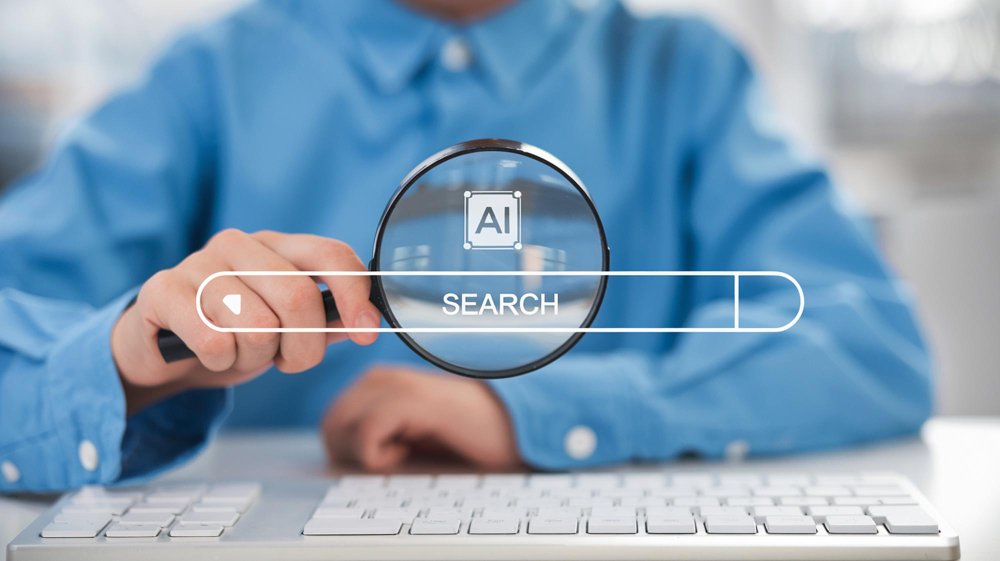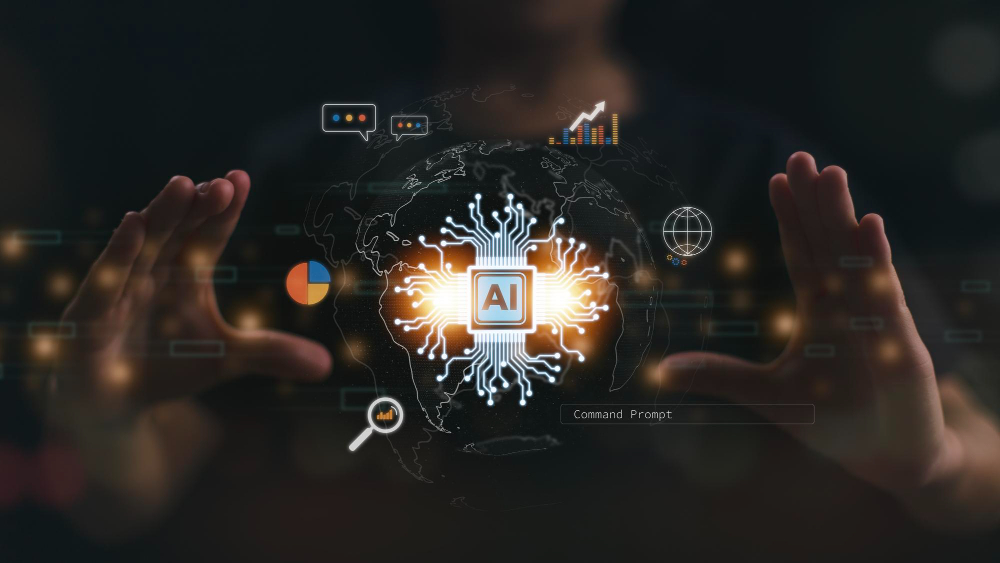Search is changing in a revolutionary manner. What started as a basic application to scan a written text and find relevant words has now developed into a highly sophisticated tool- a machine that not only comprehends but also recognizes the nuances of meaning, context, and intent. The role of Google in this transformation is the paramount one, the one that keeps using Google AI along with redefining and impacting the way we discover and interact with information.
Honestly, it all boils down to this: the future of search will not be characterized by pouring words into a box and then browsing through links, but rather the unveiling of the intelligent, talking system that will, in no time, grasp the user’s intent and supply it. Let’s go into the details of how the next-gen AI search technology of Google is reshaping that future and what it implies for the users, creators, and the digital ecosystem.

How Search Got Here
To map out our journey to the future, we need to understand the past of search. In the early 2000s, the algorithms were mainly looking for the exact words to match. Then the PageRank made its entrance, followed by the semantic search and the knowledge graphs. Each of them is a step, a little closer though not right there yet, to the understanding of meaning rather than just the words.
Today, that evolution has accelerated beyond human expectations. Google’s recent breakthroughs in Google AI have turned Search into a learning system that can synthesize, explain, and even reason with information. It’s not just indexing the web; it’s interpreting it.

The Leap: AI Overviews and Conversational Search
Google’s first big leap toward its next-gen model was the launch of AI Overviews. Instead of sending users to multiple pages, Search now generates concise summaries pulled from trustworthy sources. These aren’t random snippets; they’re structured explanations built using AI search technology that understands relationships between topics.
Then came AI Mode, the true gateway to the future of search. This mode allows users to ask layered, complex questions and refine them through conversation. Search becomes less like looking up data and more like interacting with a digital assistant that can reason through your questions.
You can ask, “What’s the best sustainable travel plan for Japan next spring?” and follow up with “Add hiking routes near Kyoto.” The AI understands the context. It keeps track of your intent and gives you a personalized response.
That is not just innovation. That is a new search philosophy.

The Engine Behind It: Machine Learning and Reasoning
We can say that the machine learning technology is the main factor for this change. The family of Google’s models, Gemini, is the main force behind this change. Not only can these models work with text, but also with images and even videos, and they will all be processed simultaneously to give more humanlike results.
Here is where the capability of AI in search engines really reveals itself. Classic search is based on page ranking, while the AI-enabled one is based on understanding the context. For instance, the question, “What’s the healthiest breakfast for someone who runs daily?” is not just searching for the pages containing those words. It takes into account your purpose, past activities, and other relevant matters such as nutrition, sleep, and metabolism.
The model first takes your question apart into small parts, then it performs several micro-searches, and finally combines them into one answer. This is a huge but undetectable jump in logic. One that is characteristic of real search engine innovation.

The Human Side: Why It Matters to Everyday Users
All this complexity translates to one thing for everyday users: Ease. Instead of scrolling through ten tabs to find an answer, you get it in one place. All written in natural language. The system understands the context and even tone.
That’s the promise of AI powered search. It turns an overwhelming information landscape into something intuitive. You no longer need to know the perfect keyword. You can just ask, like you would to a person, and expect the system to understand.
Another advantage is speed. Google’s AI-driven systems can retrieve and synthesize information in milliseconds, providing users with the best possible answers in less time than it takes to type a second query.
The future of search is about understanding intent, not input. It’s about anticipating what you’re trying to find before you even realize how to ask for it.

What It Means for Businesses and SEO
Now, this new world of search is exciting, but it also comes with disruption. The businesses and content creators who based their digital strategies on the traditional side of SEO will need to make a quick transition to the new model.
When the AI Overviews show up at the top of the results page, users will usually get what they want without the need to click into a link. That changes how traffic flows and how success is measured. Some fear this could cut into visibility, while others see an opportunity. Being cited by the AI means your content has earned its trust.
Under such circumstances, the focus of optimization will not be on tricking the algorithms anymore. It will be the most credible, valuable, and well-organized source in your area.
In order to remain visible, brands have to:
- Generate in-depth and comprehensive content that answers the questions reflecting the searcher’s intention rather than just the keywords.
- Apply the use of structured data and schema markup so that the AI can quickly and easily understand and refer to your content.
- Create and nurture genuine authority by using expertise, citations, and maintaining consistent accuracy.
- Always keep the information up to date because old or expired information can negatively affect your chances of being chosen by AI models.
- Get traffic from various sources rather than depending solely on search engines.
The evolving AI of Google will be the one that favors the sources that show trust, clarity, and value. For digital marketers, this means the advent of the next generation of search engine innovations.

How AI Search Changes User Behaviour
Another fascinating shift is in how people search.
With AI Mode and conversational features, users no longer bounce between pages to compare options. They ask follow-up questions, refine results, and stay inside that interactive loop. Over time, this changes user expectations entirely. Search becomes more like dialogue and less like exploration.
That’s a big deal for brand discovery. If your brand isn’t part of the AI’s knowledge base or does not appear as a trusted source, you risk invisibility even if you’ve done everything right by older SEO standards.
It also affects how users perceive authority. People will start trusting AI summaries as the “truth layer.” Your content must either feed that layer or differentiate itself through human expertise and unique insights. Also, emotional connection.

Risks and Realities of AI-Driven Search
Any powerful system has its own challenges. Generative AI can make mistakes. Presenting confident but wrong answers or blending facts inaccurately. Google is aware of this and continuously refines grounding, verification, and feedback loops to improve factual accuracy.
Bias is another concern. AI technology relies on vast amounts of data. If that data is biased or unbalanced, then the results may also be biased. The next few years will see a large influx of more and more AI in search engines around us. The way we will use them will rely heavily on their transparency and accountability.
Another open question is data ownership. If your website content is summarized in an AI answer without a direct click to your page, how should that contribution be credited? Google has promised to maintain clear citations, but the balance between convenience and fairness is still being tested.
Finally, privacy and personalization will collide. The same personalization that makes search results feel intuitive depends on access to user data. Expect stronger controls, clearer consent mechanisms, and more regional differences in how this plays out.

What the Future of Search Could Look Like
Project forward five years, and here’s what seems likely.
Search will move beyond static queries toward dynamic, multi-step tasks. You’ll be able to plan a trip, compare gadgets, or research a project through an ongoing conversation with AI. You’ll upload photos, documents, or voice notes, and the system will handle all of it seamlessly.
Visual and voice search will merge into one experience. Text will remain part of it, but the way we “search” will feel more like interacting with an intelligent system that sees, listens, and reasons.
At the backend, machine learning technology will keep improving, allowing AI to understand emotions, opinions, and even humour. Instead of showing options, it will give personalized recommendations.
This is where AI search technology becomes indistinguishable from daily life. From shopping and research to entertainment and productivity, AI-driven systems will anticipate your next question before you ask it.

What Marketers Should Do Right Now
Marketers and creators can either resist these changes or get ahead of them. The smart move is adaptation.
- Understand intent deeply. Think beyond keywords. What is your user trying to accomplish? Write content that satisfies that journey from start to finish.
- Create data-rich, structured content. Use schema, metadata, and well-organized hierarchies. AI systems love clarity.
- Show expertise. Include author bios, credentials, and sources. AI ranks credibility as highly as relevance.
- Invest in multimedia. Images, infographics, podcasts, and videos are all signals that improve content utility.
- Monitor emerging search trends. Pay attention to how people phrase queries in natural language. Those patterns reveal what AI will prioritize next.
Search visibility will belong to the brands that help AI do its job better. Not the ones that try to outsmart it.
Challenges Google Still Faces
Google continues to lead the way, but the company’s next-generation AI still has to deal with some tricky issues, such as the following:
- Speed vs accuracy: the AI should be able to give instant replies without compromising on the truthfulness of the information.
- Personalization and privacy: knowing more about the user leads to better performance, but it also increases the risk of ethical dilemmas.
- Automation versus opportunity: If everything is done by AI, what will be the role of publishers and content creators?
These are not simple problems. But solving them will define the next decade of digital life.
Why This Moment Matters
The web has always been about discovery. Search made it navigable. Now AI is making it intelligent.
This shift is not just technological; it’s cultural. It changes how people learn and how brands communicate. Also, how trust is built online. In time, users will not think about “searching” anymore. They will simply ask and expect answers.
That is the destiny of Google AI. To turn search into understanding, and information into action.
Conclusion
The story of search is far from over, but we’re entering its most transformative chapter. Google’s next-generation systems, powered by ai powered search, are reshaping not just how we find information, but how we think about it.
Businesses and creators will all need to rethink their strategies. The winners in this new landscape will be those who focus on clarity and depth with genuine value. Because AI can now tell the difference.
The future of search is no longer about results being delivered faster; it is about the results being smarter. The technology maturation is going to make human and information interaction feel more natural and less mechanical.
At Being Digitalz, we are witnessing this change and considering it an opportunity instead of a threat. We are in a moment when it is possible to build, adapt, and create experiences that can thrive in an AI world. The future of search has already arrived. It is just a question of whether you are ready to face it or not.

